
Anno 601 - 700

|
Popes on Parade Anno 601 - 700 |
POPshop |
 |
Saint Gregory I |
Born c. 540. A Roman of a wealthy, aristocratic family. His father was Gordianus Amicia, who owned huge tracts of land in Sicily, and his mother was St. Silvia. Gregory was Prefect of Rome in 573, but retired to a monastery after the death of his father. He gave up everything; even the Sicilian estates were sold to found six monasteries. Gregory quickly became abbot, then a deacon in the Roman Church, then Papal nuncio to the court of the Byzantine Emperor. With the death of Pelagius, the Romans unanimously chose Gregory for Pope. He refused. The Emperor insisted. Gregory threatened to run away. And then came the first miracle: Gregory agreed to "temporarily" administer Rome while waiting for his final plea to the Emperor to be answered. He organized a massive public procession of repentance. As they passed the mausoleum of the Emperor Hadrian (one of the few landmarks not destroyed by the various invaders), the penitents saw a vision of the Archangel St. Michael on top of the mausoleum in the act of sheathing his sword. The miracle was interpreted as a sign that the plague was over, and indeed it was. Word came back from the Emperor that he would accept no other as Pope but Gregory. Faced with the combined messages of God and Emperor, Gregory finally agreed to be Pope. With Gregory's accession, we at last have a tiny glimmer of light in the Dark Ages. During his pontificate, Gregory:
Even with all of these great accomplishments (and many, many more unlisted), Gregory was far more popular outside of Rome than within the city. Once again, a terrible famine struck Italy in 604, and the people blamed him for it. Regarded throughout the Christian world as a saint, a philosopher, and a doctor of the Church, he was forgotten in Rome after his death. His epitath reads consul Dei (God's consul), but the title he allowed himself was Servus servorum Dei, servant of the servants of God. |
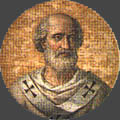 |
SabinianusAnno 604-606 |
A Tuscan from Volterra. He had been Gregory's nuncio in Constantinople. It's hard to tell whether Sabinianus was a mediocre Pope, or just didn't measure up to Gregory's (admittedly great) example. Where Gregory gave food to the poor during times of famine, Sabinianus sold it. Where Gregory appointed monks to administrative posts, Sabinianus went back to the old corrupt practices. A pontificate as indistinguished as it was brief. |
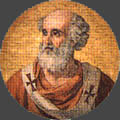 |
Boniface IIIAnno 607 |
A Greek born in Rome. The son of John Catadioce. Like Sabinianus before him, he had once served as Gregory's nuncio in Constantinople. Boniface had to wait nearly a year for imperial confirmation of his election, by which time the elderly pontiff was already at death's door. |
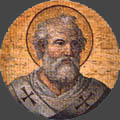 |
Saint Boniface IVAnno 608-615 |
An Italian from L'Aquila. Son of John, a physician. Like Gregory, Boniface IV lived the life of a monk. With permission of the Emperor Phocas, he dedicated the Pantheon as a Christian Church. The former Temple to Jupiter and all the Gods became the Church of the Virgin Mary and all the Martyrs. Twenty-eight cartloads of bones were removed from the Catacombs and put into a huge porphyry basin (more of a cellar, really) under the altar. |
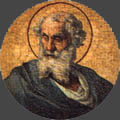 |
Saint Adeodatus I(Deusdedit) |
A Roman. Son of a subdeacon. His name means "given by God". Adeodatus is remembered for his charity and his support the impoverished clergy. During his pontificate, what little of Rome was still standing was mostly leveled by a violent earthquake. Just when they'd started rebuilding from that, a plague of leprosy devastated the survivors. People left in droves. |
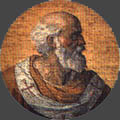 |
Boniface VAnno 619-625 |
An Italian from Naples. A quiet, dedicated man, Boniface concentrated on the conversion of England. He sent many letters to Princess Ethelberga, wife of King Edwin of Northumbria, continuing a long Papal tradition of trying to get Christian wives to convert their pagan husbands. When you find something that works, it's wise to stick with it. |
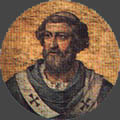 |
Honorius IAnno 625-638 |
An Italian from Campania. Honorius lived the life of a monk. He is chiefly famed for trying to reconcile the Orthodox West with the increasingly Monophysite East. He seems to have accepted a new "compromise" doctrine called Monothelism, sort of. He wrote extensively on the topic, though he never actually managed to produce any sort of definitive doctrinal document about it, throwing the entire Church into confusion. Monothelism was finally condemned as heresy by the Council of Constantinople (680-681). Oops. Honorius the Heretic became a profound embarrassment to later Popes, and he was used by the Eastern Church as an excuse for a politically-motivated schism. The fact that Honorius closely resembles Baldric from "Blackadder" is just a coincidence, really. |
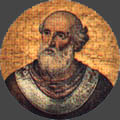 |
SeverinusAnno 640 |
An aristocratic Roman. Son of Abienus. As usual, imperial confirmation was requested after the Papal election. The Emperor, however, sent Severinus a letter requiring him to accept Monothelism. The Pope refused. The Emperor eventually confirmed him anyway, but not before sending the Exarch of Ravenna to plunder the Lateran. Severinus was very old when he was elected, and he died two months after his consecration. |
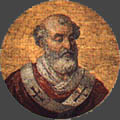 |
John IVAnno 640-642 |
A Dalmatian. Son of an attorney named Venantius. John was archdeacon of Rome before his election. John's election was confirmed by the Byzantine Exarch of Ravenna, rather than the Emperor himself. This pattern will continue while the Exarchate remains. He strongly campaigned against the heresies of Pelagianism and Monothelism. He even managed to convince the Emperor Heraclius, who returned to the Orthodox fold. He tried without success to restore the reputation of Pope John sent missionaries to the lastest barbarians to wander into Europe, the Slavs. |
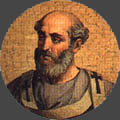 |
Theodore IAnno 642-649 |
A Greek from Jerusalem. Son of a bishop, also named Theodore. Theodore, like John before him, loudly condemned Monothelism. He got into such a dust-up with the Patriarch of Constantinople about it, that the Emperor Constans II had to break it up. He ordered that no one would henceforth be allowed to discuss the subject. The reply amongst the Western and African bishops was a universal chorus of support for the Pope. |
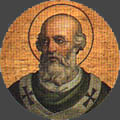 |
Saint Martin IAnno 649-653 |
An Italian from Todi. Brilliant and well-educated, Martin was a monk and a firebrand. After his election, Martin had himself consecrated without waiting for imperial confirmation. He immediately called a Church Synod in the Lateran; 105 bishops attended. Pope and Synod condemned the Monothelite heresy and the Emperor Constans II who supported it in the strongest possible terms. The Monothelite Patriarch of Constantinople was excommunicated. When the Emperor received a copy of the Synod's acts, he was flabbergasted. Theodore Calliopas, the Imperial Exarch, arrested the Pope. He was brought in chains to Constantinople, where he was imprisoned in solitary confinement for six months before being exiled to Crimea. Sick and starving, he died soon after, a martyr. The Emperor in his cruelty completely undermined the position of the Monothelites in the eyes of the Imperial citizens, who acclaimed the late Pope infallibilis fidei magister, the infallible and great teacher. |
 |
Saint Eugene IAnno 654-657 |
A Roman. Son of Rufinianus. During Martin's exile, the Church at Rome was at first administered by committee. When it became obvious the Pope wasn't coming back, the Romans elected the elderly Eugene. At first, the Emperor thought he would be pliable, and Martin condemned the election. By the end, though, the frustrated Emperor threatened to roast him on a spit, and Martin heartily approved of his successor's hard line against Monothelism. Constans II could do little but threaten, however, as he had his hands full with a new danger: Islam. By the time the Emperor had lost the naval battle of Phoenix in 655, the Caliphate had already conquered all of Persia, the Holy Land, and most of North Africa. The ancient Patriarchates of Jerusalem, Antioch, and Alexandria were no longer in Christian hands. |
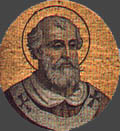 |
Saint VitalianAnno 657-672 |
An Italian from Segni. Son of Anastasius. Vitalian tried sugar instead of vinegar with the Monothelite East. He was friendly with both Patriarch and Emperor, while they all quietly agreed to tiptoe around the Monothelite question. The Emperor himself came to visit the Pope at Rome, the last Emperor to do so for nearly 700 years. On his way back to Constantinople, Constans II was assassinated in Sicily. The Pope, seeing the moment had come, took decisive action. He supported the late Emperor's son, Constantine IV Pogonatus, against a usurper. In return, the new Emperor stepped stopped all Imperial support of the Monothelites. He did nothing to surpress them, however. Small steps. |
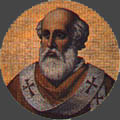 |
Adeodatus IIAnno 672-676 |
A Roman. After the death of Vitalian, the Romans elected an elderly and pious monk of the cloister of St. Erasmus. He condemned heresy and otherwise just sort of doddered along for four years. |
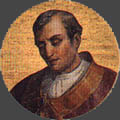 |
DonusAnno 676-678 |
A Roman. Son of Mauricius. After the ancient Adeodatus, the Romans might have thought they were electing someone young and vigourous to be Pope. Donus foiled them by quickly falling ill and dropping dead. |
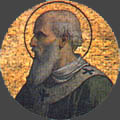 |
Saint Agatho, |
A Sicilian, Agatho was a Benedictine monk at St. Hermes in Palermo before his election. A young Pope not having worked out so well, the Romans this time apparently elected the oldest guy they could find. Agatho was over 100 when he was elected, and he was seriously tired of the the whole Monothelite controversy. Emperor Constantine IV agreed. The Sixth Ecumenical Council was called at Constantinople in 680. The papal legates presided, and the Monothelite heresy was definitively condemned. Before the news arrived in Rome for the Pope's approval, Agatho was dead. Pope Agatho was known for many miracles; his epithet Thaumaturgus means "wonderworker". |
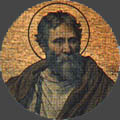 |
Saint Leo IIAnno 682-683 |
A Sicilian. Leo reformed the system of Papal elections and confirmed the decrees of the Council of Constantinople. He condemned Pope Honorius I, not because he was actually a Monothelite heretic but because he hadn't done enough to oppose Monothelism. The distinction was lost to most who read the decree. Leo took a special interest in Church music. |
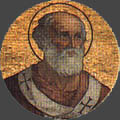 |
Saint Benedict IIAnno 684-685 |
A Roman. Generous to the poor, Benedict began many building projects within the city. He secured from the Emperor permission to dispense with imperial confirmation of Papal elections, or else to obtain confirmation from the Exarchs at Ravenna. |
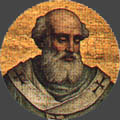 |
John VAnno 685-686 |
A Syrian from Antioch. Son of Cyriacus. John was one of the Papal legates at the Council of Constantinople. He was ill when he was elected, and he never really recovered. |
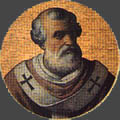 |
CononAnno 686-687 |
A Sicilian; the son of a soldier. Conon was quite old when he emerged as a compromise candidate during a highly contested election. For all his venerable appearance and simple habits, Conon turned out to be a bit of a turkey as Pope. As Conon lay dying, the archdeacon Paschal bribed the Exarch of Ravenna into appointing him the next Pope. A group of Romans caught wind of this and elected the archpriest Theodore as Pope before Conon's body was even cold. |
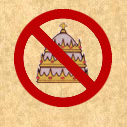 |
Paschal(Antipope) |
The archdeacon Paschal, armed with a writ from the Imperial Exarch, attempted to take the Lateran by force. The Romans resisted him. With the sounds of rioting outside in the streets threatening to drown out the proceedings, the Romans elected a Syrian named Sergius. Paschal's supporters withdrew from the city, but he never gave up his claim to the papacy. |
 |
Theodore II(Antipope) |
The archpriest Theodore was elected by a group of his closest friends, mostly to forestall Paschal. He backed down shortly after Sergius' election. |
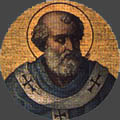 |
Saint Sergius IAnno 687-701 |
A Syrian from Antioch, Sergius was educated in Palermo, Sicily. Son of Tiberius. After a rocky election, Sergius settled down as Pope to great popular acclaim. He paid particular attention to the development of the English Church. The somewhat psycho Emperor Justinian called and ran roughshod over a Council in Constantinople (the so-called "Quinisext" Council) that proclaimed the primacy of the Patriarch of Constantinople. Needless to say, Sergius refused to have anything to do with the Quinisext Decrees. Justinian ordered Sergius' arrest, but the Imperial armies in Rome rallied to the Pope's defense. Shortly thereafter, Justinian was himself deposed, and the Quinisext Decrees were quietly forgotten. Sergius added the Agnus Dei to the mass. |
Complete List of Popes
First Century |
Second Century |
Third Century |
Fourth Century |
Fifth Century
Sixth Century |
Seventh Century |
Eighth Century |
Ninth Century |
Tenth Century
Eleventh Century |
Twelfth Century |
Thirteenth Century |
Fourteenth Century |
Fifteenth Century
Sixteenth Century |
Seventeenth Century |
Eighteenth Century |
Ninteenth Century |
Twentieth Century
Twenty-First Century
Ecumenical Councils | Papal Box Scores